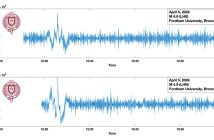The U.S. Secret Service has enlisted two Fordham administrators to help safeguard millions of Americans from electronic crime, a thriving illegal enterprise in the information age. For the past year, Jason Benedict, director of computer services, and David Whitney, manager of system engineering, have been part of the New York Electronic Crimes Task Force (NYECTF). This national law enforcement body was formed by the Secret Service in 1995 and tailored exclusively to protect Americans from hackers, identity thieves and other cyber criminals.
In their efforts, Benedict and Whitney collaborate with more than 250 people from federal, state and local law enforcement agencies as well as private companies and other universities. “Cases involving electronic crimes, viruses, worms, identity theft all fall under interstate commerce, since they very often cross state, country and sometimes even hemisphere boundaries,” said Benedict. “So you need a federal organization that has that kind of jurisdiction.” In a July 23 article in Roll Call, a prominent Capitol Hill newspaper, Brian L. Stafford, director of the U.S. Secret Service, discussed the electronic task force’s unique makeup.
“It became clear to the Secret Service that we could not employ conventional tactics to prevent an unconventional crime,” he wrote. “If we are serious about computer crime prevention, law enforcement must enlist the technical resources and expertise of the private sector and academia.” According to Benedict and Whitney, their function in the group is to provide technical support. For example, if a hacker infiltrates a software system, the task force may rely on their expertise to remedy the problem.
Benedict said that in addition to their contributing to the group, both he and Whitney have learned a great deal from the task force’s quarterly meetings. “We are in the process of installing a wireless network here at Fordham and at a meeting were able to see a live, real-time demonstration of how someone would hack and penetrate a wireless network,” Benedict said. “Now instead of that just being conceptual, we’ve actually seen it done and know how to prevent it from happening.” Since its formation, NYECTF’s efforts have been extremely successful, charging more than 800 people with electronic crimes valued in excess of $425 million. Given this success, the Secret Service is looking to expand the program to other major cities across the nation such as Chicago, Los Angeles and San Francisco.


